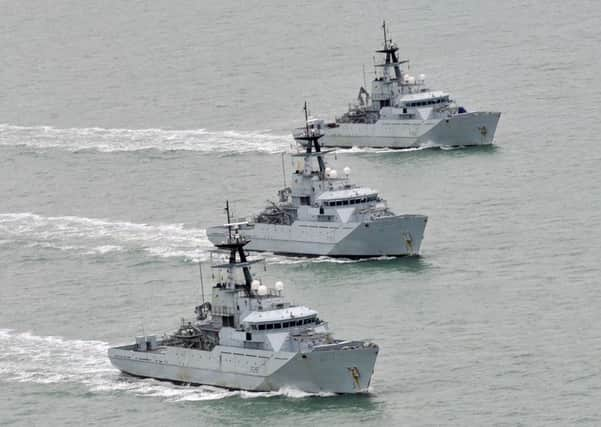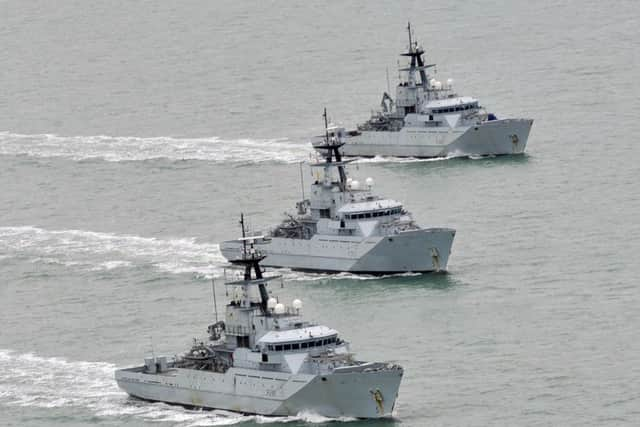Navy hatches plan for border patrols after EU departure


Uncertainty remains over the three batch one River-class vessels that could be phased out and replaced by five, larger and more capable warships. One, HMS Severn, was decommissioned last year.
However, one of the navy’s top commanders has said the Royal Navy is drafting up contingency plans to keep the ships in service – should the government ask.
Advertisement
Hide AdAdvertisement
Hide AdThey would be used to bolster the UK’s maritime borders, by increasing the overall number of warships capable of patrolling Britain’s coastal shores at any one time.


Rear Admiral Chris Gardner, assistant chief of naval staff (ships), admitted the Royal Navy was ‘keen’ to keep the ships.
Speaking to The News, Rear Adm Gardner said: ‘At the moment no decision has been taken about what their future could be.
‘I’m keeping the ships in a state of operational readiness which means that as the future becomes a bit clearer post-Brexit, and as our requirements are more broadly understood, we will be able to make decisions about whether or not we will seek to retain and operate them as additional units in the Royal Navy or find some other solution.’
Advertisement
Hide AdAdvertisement
Hide AdPressed on whether the vessels could play a critical role in protecting the UK’s borders after Brexit, Rear Adm Gardner said: ‘Absolutely they could.


‘It wouldn’t come without its challenges because we would have to find the crews but there are ways and means for us to be able to do that.
‘It’s certainly something the Royal Navy would be very, very keen and willing to undertake should we be asked to do so.’
He added: ‘This is, however, a political decision and down to the government of the day to decide what the requirement is and then to ask us to fulfil that requirement.
Advertisement
Hide AdAdvertisement
Hide Ad‘But until we can get firm direction by the government we are just planning.’
The statement comes after Guto Bebb, parliamentary under-secretary for defence, revealed last month a £12.7m fund had been allocated from the EU exit preparedness fund to preserve three batch one River-class ships should they be needed after Brexit.
Retaining the older OPVs would help to free up the more advanced batch of patrol ships, the first of which was commissioned into the Royal Navy in Portsmouth on Friday.
Commander Sarah Oakley heads up the Royal Navy’s fishery protection squadron, which seeks to enforce maritime laws in British waters.
Advertisement
Hide AdAdvertisement
Hide AdShe said the fleet of OPVs were ‘absolutely vital’ to the UK’s defence and reach overseas.
The naval officer added with the introduction of the new, upgraded River-class vessels, the Royal Navy would be more flexible than ever before.
She said: ‘Their main role is maritime security and we will have these ships and some of the squadron definitely patrolling around UK waters.
‘We’re also hopeful that they will be able to project power overseas as well, so that could be overseas in the Falklands but maybe as far as the Caribbean, who knows, maybe as far as the Far East.’
Advertisement
Hide AdAdvertisement
Hide AdLast year HMS Severn was decommissioned after just 14 years of service. Her three other sister ships are still in active service.
As well as conducting patrols of the UK’s waters, the vessels have also been key in tackling drug gangs and providing aid in humanitarian crises.
Currently there are three based around the UK and Europe with one, HMS Clyde, stationed near the Falkland Islands.
HMS Forth is due to be operational active by September. The majority of the remaining four batch two warships will join the fleet in 2019, with the last entering service in 2020.